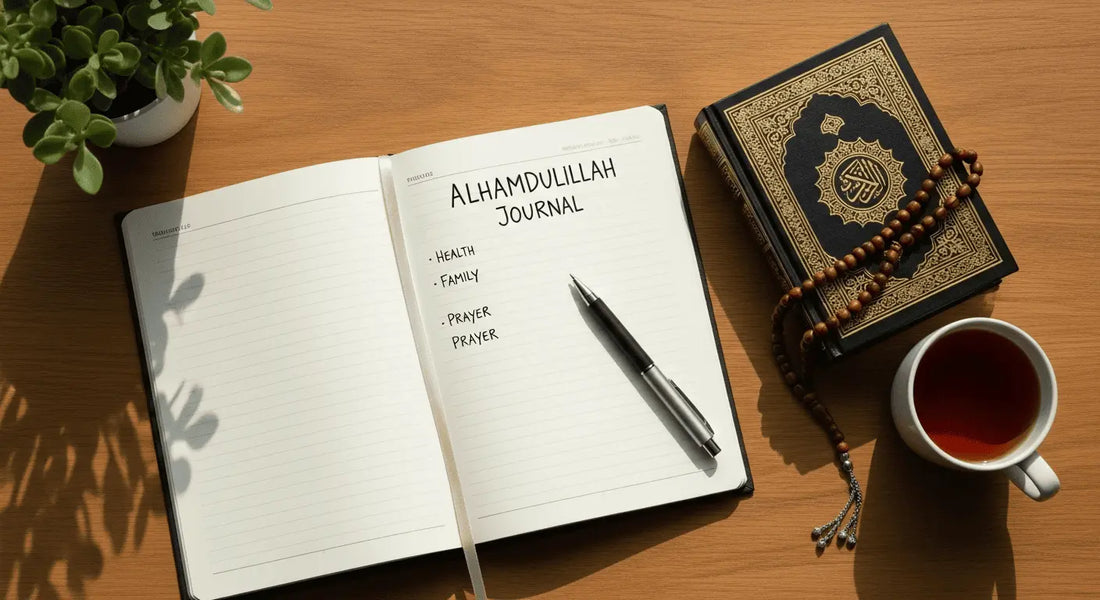
Benefits of Gratitude Journaling in Islam
Share
1. Introduction: Gratitude as a Core Value in Islam
One of the strongest principles that Islam emphasizes is gratitude, or shukr. Numerous times throughout the Qur'an, Allah ﷻ reminds believers to express gratitude, and the Prophet Muhammad ﷺ's Sunnah is replete with instances of how to live a life of thankfulness.
Journaling has gained popularity as a means of introspection and mindfulness in the modern world. In Islam, keeping a gratitude journal is a lovely habit that not only supports the teachings of the Qur'an but also helps Muslims become more mentally and emotionally healthy while strengthening their faith.
2. Qur’anic Foundations of Gratitude (Shukr)
The Qur’an highlights the importance of gratitude as a key to unlocking more blessings. Allah ﷻ says:
“If you are grateful, I will surely increase you [in favor]; but if you deny, indeed, My punishment is severe.” (Qur’an 14:7)

This verse reminds us that being thankful is not just an act of worship but a path to greater barakah in life. Gratitude connects us directly to Allah, and journaling is one way to nurture this habit consistently.
3. Sunnah and Prophetic Teachings on Gratitude
The Prophet Muhammad ﷺ embodied gratitude in every aspect of his life. He ﷺ encouraged believers to appreciate even the smallest blessings. One hadith states:
“Whoever does not thank the people has not thanked Allah.” (Tirmidhi)
His daily life—whether in prayer, eating, or resting—was marked by shukr. Following his example, Muslims can use journaling as a tool to reflect on Allah’s countless favors.
4. What is Gratitude Journaling in Islam?
Gratitude journaling in Islam is the intentional practice of recording the blessings Allah has given, while reflecting on them spiritually. It goes beyond simply writing what you’re thankful for—it’s about connecting those blessings back to your relationship with Allah.
Practical steps include:
- Writing down daily blessings with Alhamdulillah.
- Reflecting on how these favors strengthen iman.
- Linking blessings with Qur’anic verses and du’as.
5. Benefits of Gratitude Journaling in Islam

Spiritual Benefits
- Strengthens iman by reminding you of Allah’s constant favors.
- Increases mindfulness of Allah in daily life.
- Builds reliance and tawakkul on Allah.
Mental Benefits
- Reduces stress and worry by focusing on positives.
- Improves mood and emotional balance.
- Helps combat negativity and anxiety.
Practical Benefits
- Enhances consistency and discipline.
- Creates a more positive outlook in work and family life.
-
Boosts focus and daily productivity.
6. How to Start an Islamic Gratitude Journal

Starting is simple. All you need is a diary or a faith-based planner designed for Muslims. To make journaling meaningful:
- Choose a planner that includes Islamic prompts and reflections.
- Set a daily or weekly routine (e.g., before bed or after Fajr).
- Write 3 things you are grateful to Allah for each day.
-
Include du’as and verses that inspire gratitude.
Explore the Muslim Planner to begin your journey.
7. Examples of Gratitude Prompts for Muslims
Here are some prompts to inspire your journaling:
- “Alhamdulillah for my health today.”
- “Alhamdulillah for answered du’as this week.”
- “Alhamdulillah for the rizq Allah has provided.”
-
“Alhamdulillah for the people who support me.”
8. Gratitude Journaling During Ramadan & Special Occasions
Ramadan is a month of reflection and remembrance. Using a gratitude journal during this blessed month can deepen your connection to Allah. Writing down the blessings of fasting, answered du’as, and spiritual growth can make your Ramadan experience even more meaningful.

Similarly, after Eid, reflecting on family gatherings, provisions, and joy can serve as a reminder of Allah’s mercy.
9. Linking Gratitude Journaling to Productivity
Shukr is not just spiritual—it has a practical impact on productivity. When Muslims focus on blessings instead of shortcomings, they attract barakah in their time and work. Gratitude journaling keeps you centered, motivated, and less distracted.
When combined with tools like the Muslim Planner, journaling transforms into a lifestyle practice that balances faith and productivity.
10. Conclusion
Gratitude journaling in Islam is more than a self-help tool—it’s a spiritual practice rooted in Qur’an and Sunnah. By recording blessings, Muslims can strengthen their iman, improve mental health, and find barakah in their daily lives.
If you haven’t started yet, this is your sign to begin. Start small, remain consistent, and let gratitude shape your heart and mind.
Begin your gratitude journaling journey today with the Muslim Planner.
If you have any questions about the Muslim Planner, whether it’s regarding features, usage, or placing an order, our team is here to help. We value connecting with our community and making sure you get the support you need on your productivity journey. Feel free to contact us anytime, and we’ll be happy to assist you.


